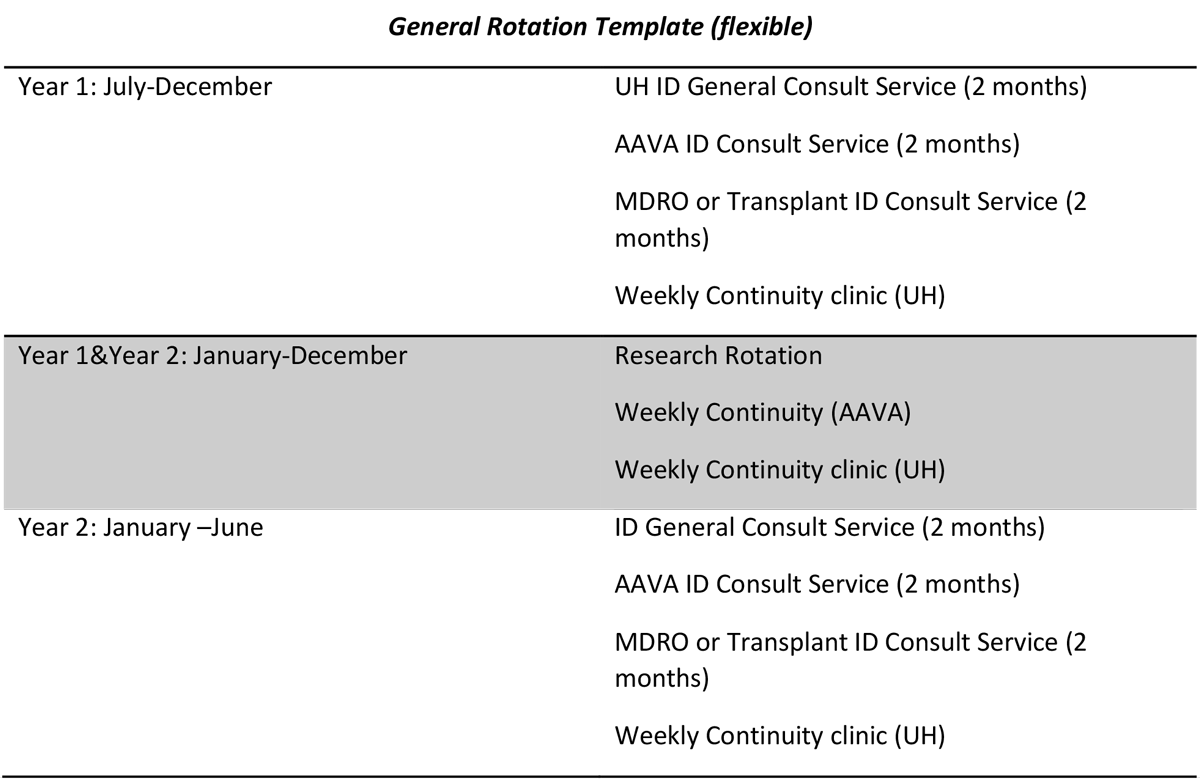Inpatient Clinical Service
Our fellows act as infectious disease consultants at Michigan Medicine and the Veterans Affairs Ann Arbor Healthcare System (VAAAHS). At the VAAAHS, we have one consult service staffed by an attending, fellows, and various other learners including internal medicine residents and medical students.
For many years, clinical consultation blocks have been scheduled during July - December during the first year and from January - June during the second year of training. However, with an expansion in the size of our fellowship, we are able to offer flexibility to meet an individual fellow’s needs. For example, a fellow interested in a career in laboratory medicine may want to complete additional clinical months during the first year to create longer, continuous time devoted to developing a research program.
 UH= University Hospital; AAVA=Ann Arbor VA; MDRO=multidrug resistant organism
UH= University Hospital; AAVA=Ann Arbor VA; MDRO=multidrug resistant organism
During these 6-month blocks, two weeks of vacation and at least two full weekends will be supplied by fellows not on service to reduce fatigue and burnout. This schedule provides a largely uninterrupted year (month 7 to month 18) to pursue a significant research project and elective opportunities, however, this can be modified for those who would like to do additional clinical months earlier in fellowship.
Ambulatory Clinic
Consult patients seen at Michigan Medicine who require outpatient follow-up are scheduled in the fellow’s outpatient clinic. If the fellow’s clinic spots are filled, the attending on service will see the follow-up patients. If the attending on service does not have a University clinic, alternative arrangements will be made. We think it is critical that fellows are involved in the entire episode of care. Some of these visits are with individual patients that a fellow may follow continuously for the entirety of their fellowship. During their research rotation, fellows will also attend a half-day weekly clinic at the Ann Arbor VA. A weekly meeting precedes clinic and allows clinic operations to run smoothly.
The fellows have significant responsibility in these clinics. They are the first to see the patients, to assemble all of the necessary data, review it, and develop a management plan. The plan is then discussed with a faculty member, and the faculty member either approves or amends the plan. At both outpatient facilities, patients requiring continuing care are assigned to the fellow who performed the inpatient consultation. More than one faculty member may supervise a case on subsequent visits, however, a fixed group of attending physicians staff the fellow’s clinics to improve continuity of care. Patients are not transferred from fellow to fellow or from fellow to attending until one of the trainees graduates from the program. At that point, all of the patients assigned to a graduating fellow are transferred to an incoming fellow or faculty member.
Clinics are never held without the physical presence of an attending physician. After evaluating patients, fellows present all of the relevant clinical data to the attending faculty member in the clinic staff room while the patient is still present. The faculty member may use this opportunity to teach, to recommend reading or specific research relevant to the patient’s problems, and to supervise specific details of the management. The faculty member will review and confirm critical physical findings. Fellows will then dictate notes concerning the patients’ visits, which are reviewed by the faculty member before they are added to the medical record. The fellow’s note is always co-signed by the faculty member.
A Ryan White Funded HIV/AIDS Treatment Program has been part of the division since 1995. The program has grown significantly and now cares for over 900 active HIV positive individuals. In a typical year, we see over 100 new patients and a portion of these patients are assigned to fellows. Furthermore, fellows care for HIV positive individuals seen at the VAAAHS.



